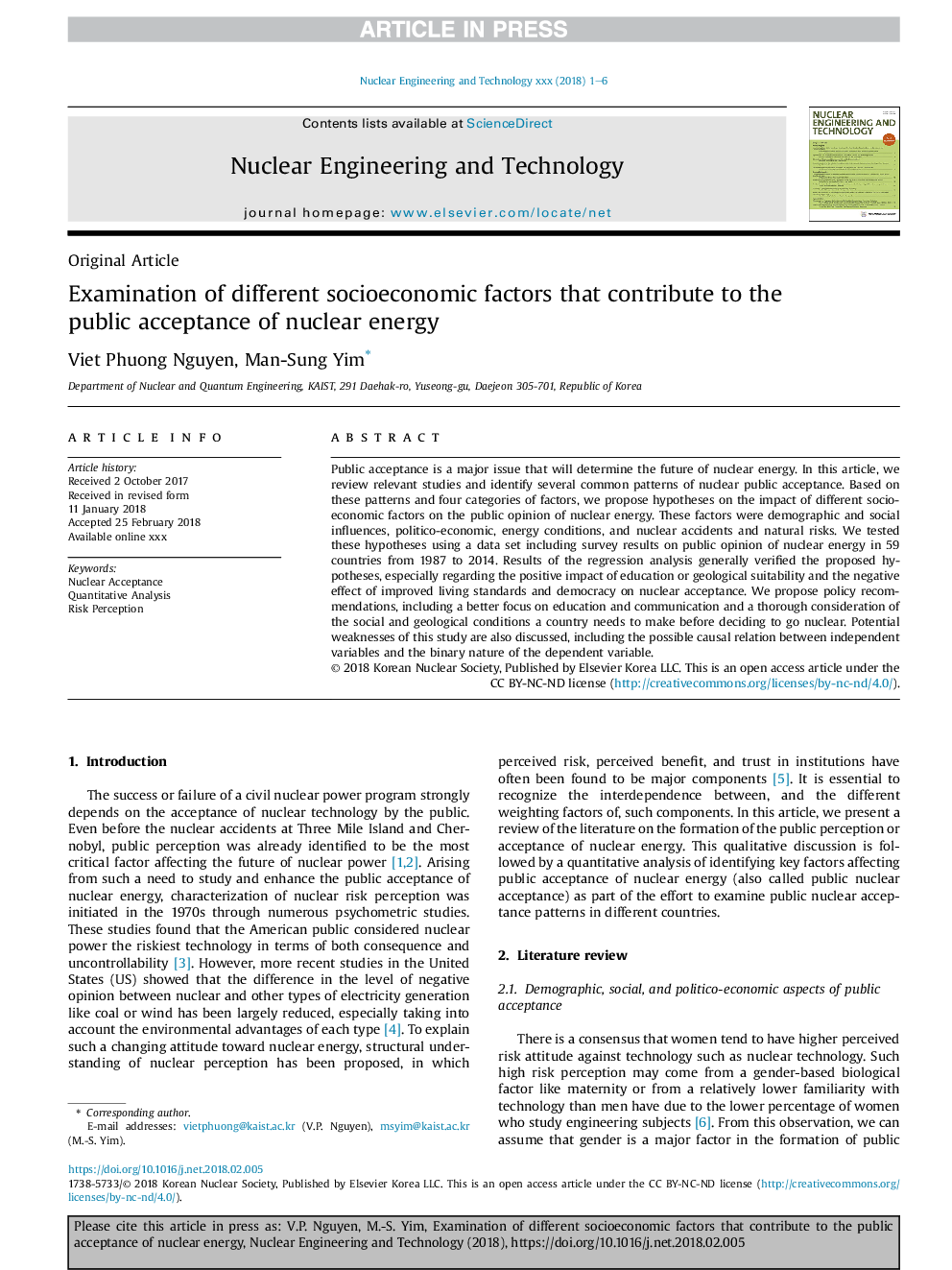| کد مقاله | کد نشریه | سال انتشار | مقاله انگلیسی | نسخه تمام متن |
|---|---|---|---|---|
| 8083716 | 1521702 | 2018 | 6 صفحه PDF | دانلود رایگان |
عنوان انگلیسی مقاله ISI
Examination of different socioeconomic factors that contribute to the public acceptance of nuclear energy
ترجمه فارسی عنوان
بررسی عوامل مختلف اجتماعی و اقتصادی که به پذیرش عمومی انرژی هسته ای کمک می کند
دانلود مقاله + سفارش ترجمه
دانلود مقاله ISI انگلیسی
رایگان برای ایرانیان
کلمات کلیدی
پذیرش هسته ای، تجزیه و تحلیل کمی، درک ریسک،
ترجمه چکیده
پذیرش عمومی یک مسئله مهم است که آینده انرژی هسته ای را تعیین می کند. در این مقاله، ما بررسی های مربوطه و شناسایی چندین الگوهای مشترک پذیرش عمومی هستیم. بر اساس این الگوها و چهار دسته عوامل، فرضیه های ما در مورد تأثیر عوامل مختلف اجتماعی-اقتصادی بر افکار عمومی انرژی هسته ای پیشنهاد می شود. این عوامل تأثیرات جمعیتی و اجتماعی، شرایط سیاسی-اقتصادی، انرژی و حوادث هسته ای و خطرات طبیعی را داشتند. ما این فرضیه ها را با استفاده از یک مجموعه داده ای از جمله نتایج نظرسنجی در مورد افکار عمومی انرژی هسته ای در 59 کشور از سال 1987 تا 2014 مورد آزمایش قرار دادیم. نتایج تجزیه و تحلیل رگرسیون به طور کلی فرضیه های پیشنهادی را به ویژه در مورد تأثیر مثبت آموزش و پرورش یا مناسب بودن زمین شناسی و تأثیر منفی بهبود استانداردهای زندگی و دموکراسی در پذیرش هسته ای. ما پیشنهادات سیاستی را پیشنهاد می کنیم، از جمله تمرکز بهتر بر آموزش و ارتباطات و بررسی دقیق شرایط اجتماعی و زمین شناسی که کشور باید قبل از تصمیم گیری در مورد اتمسفر انجام دهد. ضعفهای بالقوه این مطالعه همچنین شامل موارد احتمالی رابطه بین متغیرهای مستقل و ماهیت باینری متغیر وابسته است.
موضوعات مرتبط
مهندسی و علوم پایه
مهندسی انرژی
انرژی هسته ای و مهندسی
چکیده انگلیسی
Public acceptance is a major issue that will determine the future of nuclear energy. In this article, we review relevant studies and identify several common patterns of nuclear public acceptance. Based on these patterns and four categories of factors, we propose hypotheses on the impact of different socioeconomic factors on the public opinion of nuclear energy. These factors were demographic and social influences, politico-economic, energy conditions, and nuclear accidents and natural risks. We tested these hypotheses using a data set including survey results on public opinion of nuclear energy in 59 countries from 1987 to 2014. Results of the regression analysis generally verified the proposed hypotheses, especially regarding the positive impact of education or geological suitability and the negative effect of improved living standards and democracy on nuclear acceptance. We propose policy recommendations, including a better focus on education and communication and a thorough consideration of the social and geological conditions a country needs to make before deciding to go nuclear. Potential weaknesses of this study are also discussed, including the possible causal relation between independent variables and the binary nature of the dependent variable.
ناشر
Database: Elsevier - ScienceDirect (ساینس دایرکت)
Journal: Nuclear Engineering and Technology - Volume 50, Issue 5, June 2018, Pages 767-772
Journal: Nuclear Engineering and Technology - Volume 50, Issue 5, June 2018, Pages 767-772
نویسندگان
Viet Phuong Nguyen, Man-Sung Yim,
